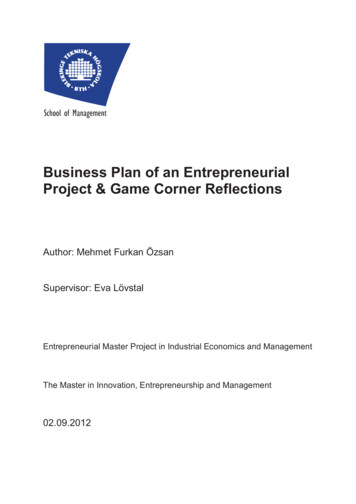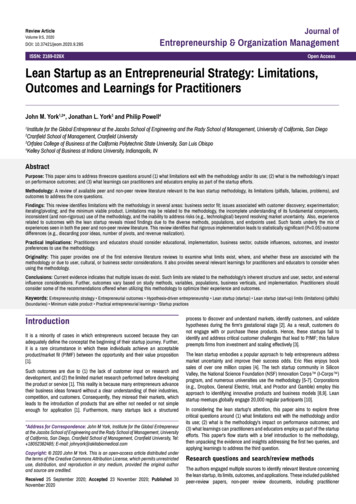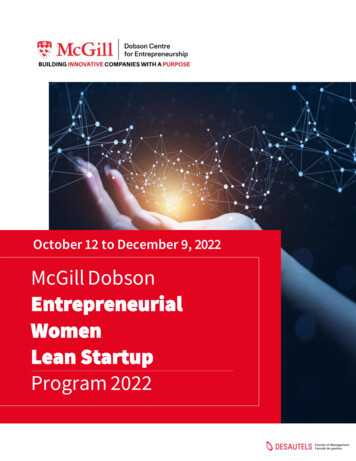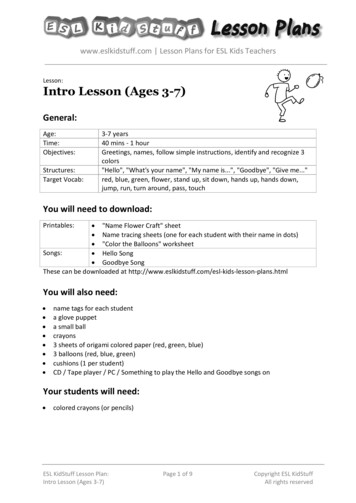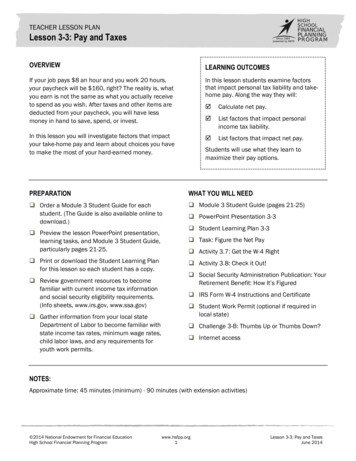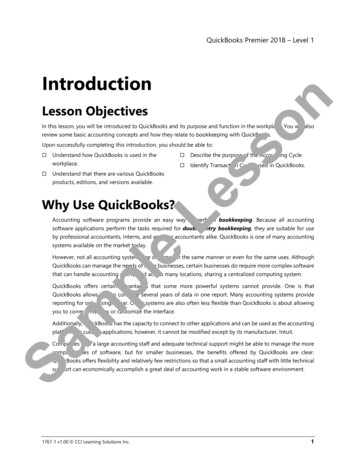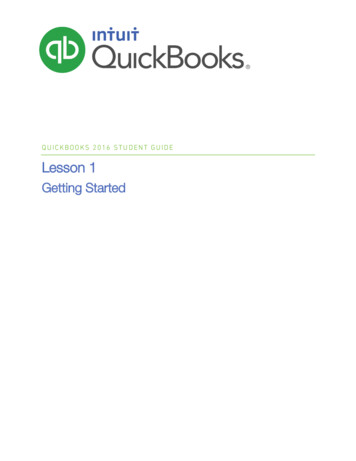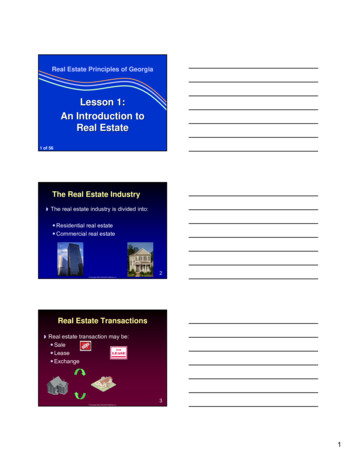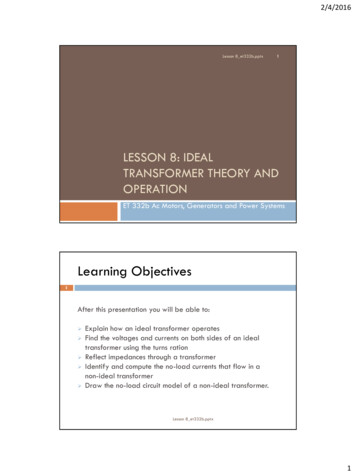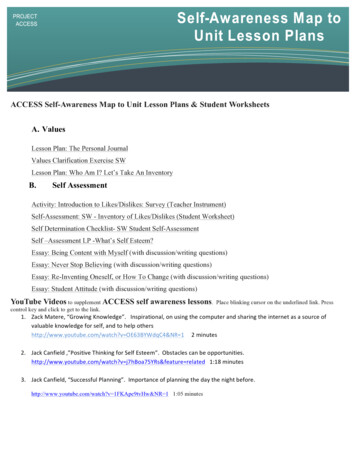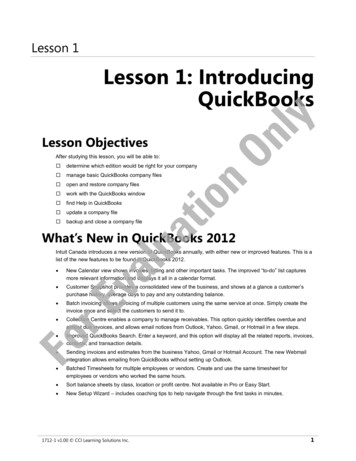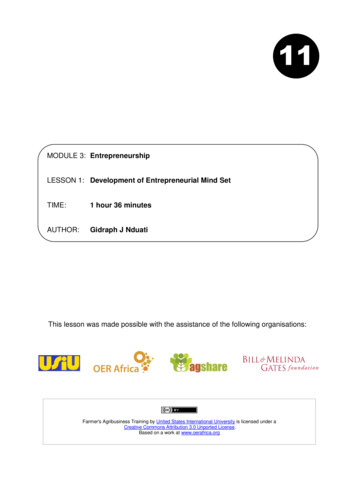
Transcription
11MODULE 3: EntrepreneurshipLESSON 1: Development of Entrepreneurial Mind SetTIME:1 hour 36 minutesAUTHOR:Gidraph J NduatiThis lesson was made possible with the assistance of the following organisations:Farmer's Agribusiness Training by United States International University is licensed under aCreative Commons Attribution 3.0 Unported License.Based on a work at www.oerafrica.org
MODULE 3Entrepreneurship1DEVELOPMENT OFENTREPRENEURIAL MIND SETLESSONAUTHOR:TIME:Gidraph J Nduati1 hour 36minutesOUTCOMES:: Understanding theentrepreneurial perspective. Understand the role ofentrepreneurship ineconomic development. Identifying sources of ideasfor new agriculturalventures. Understanding methods forgenerating new agriculturalventure ideasINTRODUCTION:: country and likeKenya is a developingmost developing countries it is faced witha high rate of unemployment. Engaging insmall scale enterprises has been seen asthe best way to create more jobs and thuscreate more employment. Starting abusiness requires an enterprising mind, amind that is able to notice businessopportunities and exploit them. MwalimuNjuguna’s case demonstrates how anindividual can develop an entrepreneurialmind set.Page 2See this case study video on the course CD ROM section underResource Index Module 3 Lesson 1Module 3: Entrepreneurship Lesson 1: Development of Entrepreneurial Mind Set
The Entrepreneurial PerspectiveEntrepreneurs take ideas and convert them into business ventures. What one requires tobe an entrepreneur is courage and passion. Anyone who wants to become anentrepreneur should consider the following: Why he/she wants to start his or her own business.How starting the business is likely to affect one’s personal life.The psychological and physical health preparedness needed, for example ability towork for long hours without harming one’s health.Aspects of the business that one sees as obstacles to business success, forexample having enough capital, skills and qualified employees.Activity 1Group Discussion (15 minutes)For this activity, you will work in groups of five. Discuss the factors that might influencepeople to start their own business.1. Make a list of at least 7 factors that the group believe motivate entrepreneurs tostart up new businesses.2. Then consider if you are motivated by any of these factors.3. Use this check list to determine your readiness to start a new venture.234567ConsiderWill starting a business impact on your personal life and familymembers?Will working long and irregular hours impact on your health?Do you have the mental tenacity to work long and irregular hours?Do you have sufficient capital to start on a limited scale?Do you have sufficient knowledge about the business to start anew venture?Do you have sufficient skills to start this new venture?Are there sufficient numbers of skilled people, potential staff, tosupport you?Yes NoPage 3#1Module 3: Entrepreneurship Lesson 1: Development of Entrepreneurial Mind Set
The Role ofEntrepreneurship in Economic DevelopmentSmall scale businesses play a big role in economic development. They support theeconomy in these ways: Creation of employment: the economic activities of small scale businesses requirepeople, hence the entrepreneur will create work for other people.Raising living standards: the entrepreneur, as well as his/her management andworkers, will receive income generated from the economic activities and thus willbe able to enjoy more goods and services.Provision of goods and services: the entrepreneur will produce agriculturalproducts such as milk, produced by Mwalimu Njuguna; he/she will also provideservices to the customers such as delivering milk to them.Contribution to savings for further investment: the economic activities will createhigher incomes and hence the entrepreneur will save some money and thesavings will be available for investment.Activity 2Case Analysis (10 minutes)In reference to Mwalimu Njuguna’s case, outline the ways in which the small scale dairyfarm has contributed to economic development.1. Review the case study video.2. In your journal, record in what ways Mwalimu has contributed to each of the foureconomic development areas mentioned above.Page 4See Feedback section at the end of this lesson foranswers and comments about Activity 2Module 3: Entrepreneurship Lesson 1: Development of Entrepreneurial Mind Set
Sources ofIdeas for New Agricultural VenturesIdeas are the building blocks in the establishment of new small scale agriculturalventures. Ideas rarely just pop into your head. You need to cultivate the skill ofdeveloping them. There are various strategies and sources you can use to developentrepreneurial ideas: Keep an idea files or a note book: record any new business idea that comes toyour mind as and when you encounter it.Newspapers and Magazines: read newspapers and magazines regularly and cutout and keep any interesting business ideas.Trade journals: identify business journals to which you can subscribe.Friends, family members and relatives: discuss your business ideas with themand allow their perspective to develop the idea further.Interact with other entrepreneurs: evaluate their businesses to see which ideascould work in your case.Dweinberger CC: BY NC SAActivity 3Group Discussions (10 minutes)1. Outline the types of ideas you can get from other entrepreneurs, family andfriends, trade journals and magazines.2. What other source has each of the group used in the past to source ideas?3. Just from your conversations with the group, have you thought of any newideas?Module 3: Entrepreneurship Lesson 1: Development of Entrepreneurial Mind SetPage 5Work in groups of five and brainstorm around these issues:
Methods forGenerating New Agricultural IdeasIdeas are abstract and need to be converted into reality. One needs to use specific methodsto walk the dream. You also require details. The next steps once you have identified a goodidea are: Read widely on your idea. Seek out as much background knowledge you can.Discuss your idea with friends and family. What impact will it have on them and onyou?Research the details on your idea. What needs to be done to get it off the ground?Test ideas on a limited scale.Activity 4Case Analysis (5 minutes)Review the case study again and reflect on these issues in your journal1. In reference to Mwalimu Njuguna’s case, identify how he converted his ideasinto reality.2. In your own experience, have you ever ‘walked the dream’? Reflect how yourjourney was different from the way as suggested above.Page 6See Feedback section at the end of this lesson foranswers and comments about Activity 4Module 3: Entrepreneurship Lesson 1: Development of Entrepreneurial Mind Set
ConclusionIn this lesson we have discussed how you can develop an entrepreneurial mind andwe have learnt how Mwalimu Njuguna developed the ideas to start his small scaledairy farm. Some say entrepreneurs are born and this is true to an extent. Somepeople identify new business opportunities almost innately. It is, however, possibleto coach yourself with a little guidance to become entrepreneurial. Hopefully, thefollowing lessons will help in this regard.SummaryIn this lesson we have learnt that entrepreneurship plays animportant role in economic development. Namely: creating employment;raising living standards;increasing national savings reserves andthe provision of goods and services.We have also seen that the following strategies and sources aregood when identifying a business idea: Keep an idea files or note book.Read newspapers and magazines.Subscribe to trade journals.Talk to friends, family members.Interact with other entrepreneurs.To develop the idea further it was advised that you,Read widely on your idea.Discuss your idea with friends and family.Research the details on your idea.Test ideas on a limited scale.Page 7 Module 3: Entrepreneurship Lesson 1: Development of Entrepreneurial Mind Set
GlossaryEntrepreneurAn entrepreneur is a person who has possession of anew enterprise, venture or idea and is accountable forthe inherent risks and the ntrepreneurial ventureA business idea that has evolved into a real businessEntrepreneurial opportunitiesThese are potential areas within the economy thatwith some resources, insight and effort could developinto a profitable business.Page 8Venture capitalVenture capital (VC) is financial capital provided toearly-stage, high-potential, growth startup companies.http://en.wikipedia.org/wiki/Venture capitalModule 3: Entrepreneurship Lesson 1: Development of Entrepreneurial Mind Set
FeedbackFeedback Activity 2Employment: Njuguna requires support at the dairyLiving Standards: He earns considerably more than he was earning as a teacher andhe pays also pays his staff.Goods & Services: Milk, insemination services, teaching dairy skills.Savings: Not discussed directly but he possibly does save some of his earnings.Feedback Activity 4Njuguna started small supplying milk to colleagues and it was once he had seen themarket expand that he began to increase production. He has steered away from largeloans and today boasts he is completely self-financed. He has made extensive use ofextension services and programmes in order to learn new things and moderntechniques. As a consequence of one of these programmes he has learnt to breedPage 9selectively to increase yields and decrease the number of cattle he must maintain.Module 3: Entrepreneurship Lesson 1: Development of Entrepreneurial Mind Set
Kenya is a developing country and like Understanding the . Ideas are the building blocks in the establishment of new small scale agricultural ventures. Ideas rarely just pop into your head. You need to cultivate the skill of . out and keep any interesting business ideas. Trade journals: identify
